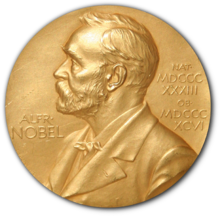Polymer chemistry is a chemistry subdiscipline that deals with the structures, chemical synthesis and properties of polymers, primarily synthetic polymers such as plastics and elastomers. Polymer chemistry is related to the broader field of polymer science, which also encompasses polymer physics and polymer engineering.
The chemist Hermann Staudinger first proposed that polymers consisted of long chains of atoms held together by covalent bonds, which he called macromolecules. His work expanded the chemical understanding of polymers and was followed by an expansion of the field of polymer chemistry during which such polymeric materials as neoprene, nylon and polyester were invented.
According to the International Union of Pure and Applied Chemistry (IUPAC),[1][2] macromolecules refer to the individual molecular chains and are the domain of chemistry. Polymers describe the bulk properties of polymer materials and belong to the field of polymer physics as a subfield of physics.













